Once a soldier.
ONCE A SOLDIER
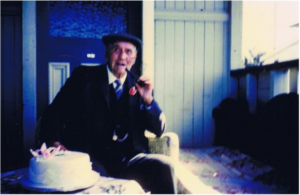
Photo of James Allan Robertson at his 90th birthday party, 4 August 1964. Author photo.
Amidst speculation that Britain may soon be immersed in war, The Suffolk with its cargo of hopeful families made its escape from London on 1 July 1914. The leaving was no doubt one of mixed and shifting emotions, with many wondering and worrying about Britain’s options and whether their country would soon be at involved in the conflict. Others would have been more concerned with what they would encounter in the new country to which they headed.
They, along with my great grandparents, Ellen and James Robertson would have had plenty of time on the journey to pray that their decision to leave the country that had been the foundation of their families for generations and head off to the other side of the world would prove successful.
Whatever possessed the thirty-nine-year-old James and thirty-six-year-old Ellen to leave their country? Times were tough in Scotland with low wages and unemployment. Perhaps the idea to emigrate was sparked by that of James’ younger brother George who had gone to Canada a few years earlier. The death of James’ father the year before may also have influenced him. His mother was still alive, although she too would pass on the following year. Both of Ellen’s parents had already died, but she had quite a few siblings to be left behind. As well as George, at least two other of James’ twelve siblings later sought better lives in Australia.
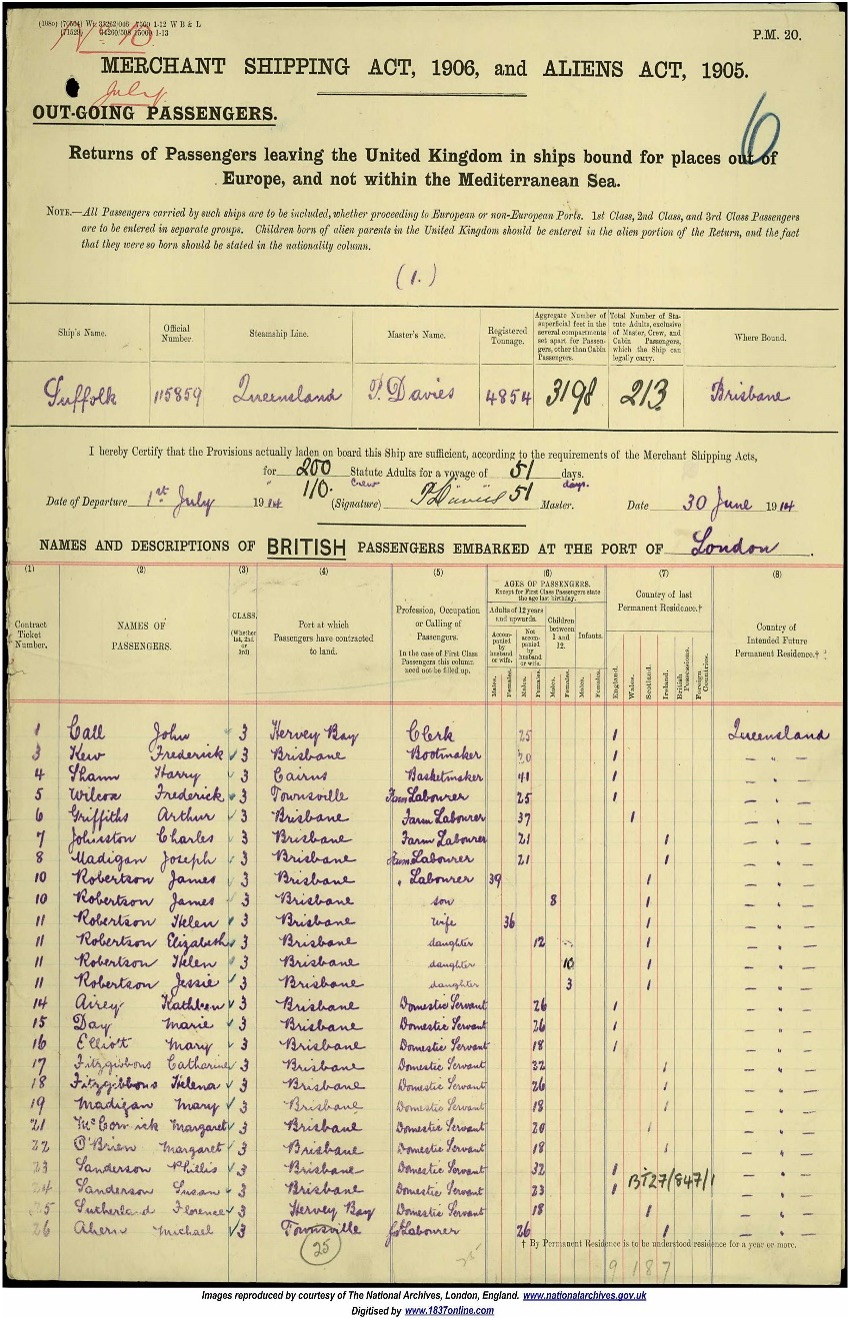
Passenger List of The Suffolk July 2014, UK and Ireland Outward Passenger Lists, 1890-1960, ancestry.com
Apparently, Queensland was vigorously seeking people through immigration agents. According to my great aunt, there were posters and competitions for schoolchildren extolling the opportunities available at every turn. And in 1914 the journey to Australia could be made in 35 to 40 days, a far cry from the several months it had taken on sailing vessels in earlier times.
James was born in Perth, Scotland in 1874.[1] Perthshire was the traditional home of many generations of Robertsons and boasts a proud and dramatic history filled with tales of Jacobite uprisings, captive queens, ancient civilisations, and the legendary Stone of Destiny. Ellen was born Helen Leitch Williamson on 13 April 1877 in the village of Loanhead about 12 km south of Edinburgh.[2] They married in Edinburgh in 1901 then moved to Glasgow where their four Scottish children were born.
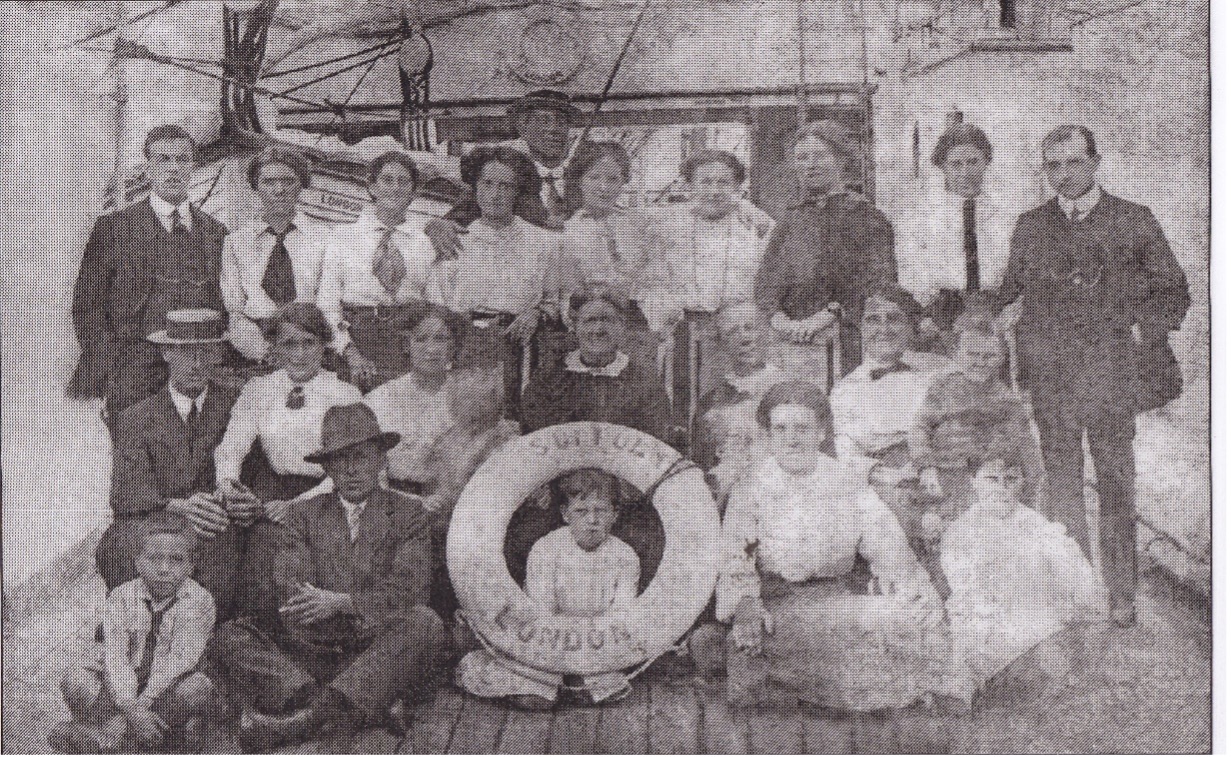
Family photo of the Robertsons on board the Suffolk in 1914. James is at the back with hat.
During the journey, Britain put the speculations to rest and officially entered the war that would become known as World War 1. That meant Australia was also at war. Jess has recounted that the ship was at Thursday Island when war was declared and had to sail on without lights because of blackout restrictions in place.[3] By October that year, The Suffolk had been reassigned as a transport ship for the Imperial Forces.
They made their way to Gundiah, a small town about 50km south-west of Maryborough where the younger children started school. The centenary celebrations of the school in 1996 was attended by several Robertson family members.
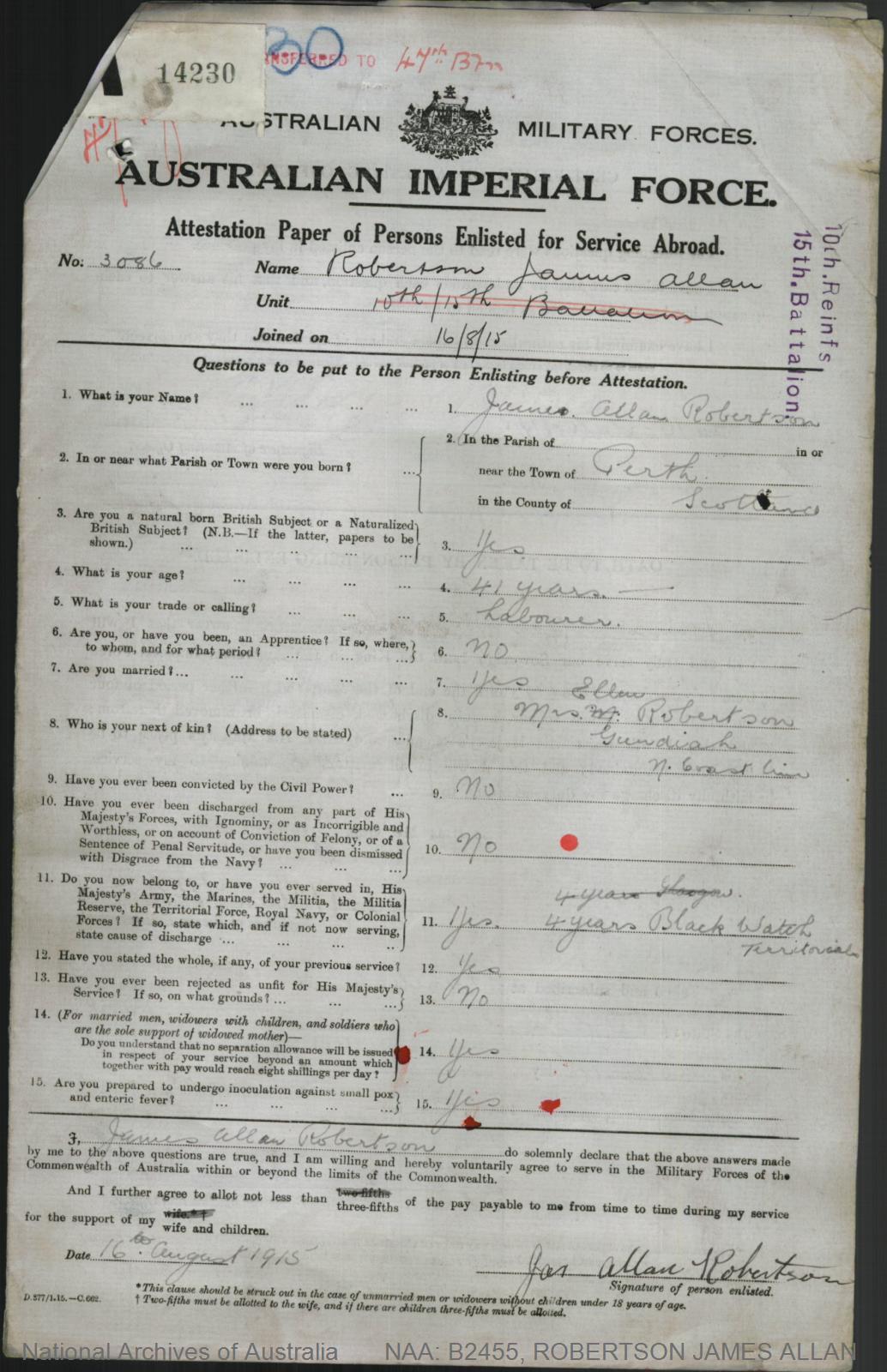
Attestation Record, NAA: Robertson, James Allan, B2455, Item ID 8034618.
In 1915, with the war well underway and after the disastrous Anzac Cove landing, the levels of enlistment by Australians from every part increased. Although the Robertsons had been in Australia for less than a year, 41 years old James decided to enlist in the AIF. I expect it was not a decision welcomed by Ellen. Perhaps work was not as plentiful as he had hoped, or maybe he, like so many others felt the need to contribute. He had a history as a soldier, having spent 4 years in the Black Watch in Scotland.[4]
When he was overseas, Ellen and her eldest daughter Lizzie worked at the hotel at Gundiah. According to his army records, James arranged to send his pay to Ellen. He enlisted at Gundiah on 16 August 1915 and left for Brisbane the following week.[5] Departing from Brisbane in October 1915 on the HMAT Warilda, he joined up with the 15th Battalion at Ismailia on The Suez Canal in Egypt in February 1916. The 15th had been formed in late September 1914, with three quarters of the battalion made up of volunteers from Queensland.
In March 1916 James was transferred to the 47th Battalion fighting in France. He was exposed to poison gas, one of the things that made this war such a horror. He seems to have been in and out of hospital over a few months until finally he was sent to Weymouth hospital in England in January 1917.[6]
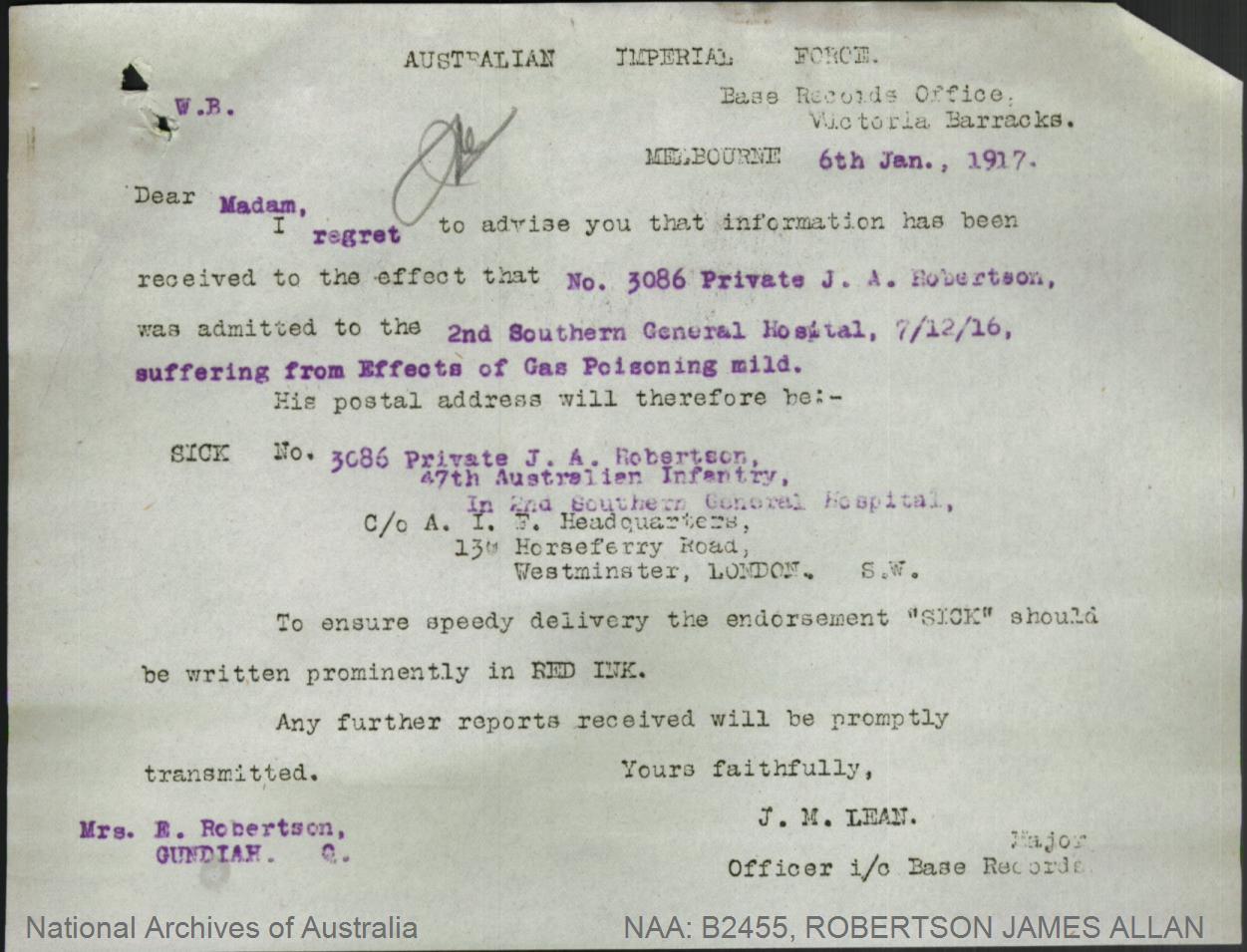
Telegram sent to Ellen Robertson, NAA, B2455, War Service record for James Allan Robertson.
What a shock it must have been for Ellen when she received the brief form letter. With such scarce details given, poor Ellen was most likely left to wonder if she would ever see her husband again. Hopefully James was able to write to Ellen and could reassure her that he was well, or as well as could be after being gassed! In April 1917 Ellen received another letter saying James would be returning to Australia at the end of May 1917. He embarked at Plymouth for Brisbane on the Barambah in April 1917.
When James returned, he took advantage of a governmental Soldier Settlement scheme for returned soldiers who had been injured but could still work. The settlement that James went to was at Beerburrum, about 55 km from Brisbane in Queensland.
What a roller coaster ride. First leaving all they had known to travel to the far-flung colony and then with hardly enough time to settle in, James was off to fight in the most horrific war, was injured, and now the family were to move to Beerburrum to become pineapple farmers.
In the book, The Beerburrum Story, by Russell Hopkins, Bella Ramm, the wife of another of the early settlers at Beerburrum has written an account of her experience in coming to the settlement.[7] She describes the hardships of these settlers, most of whom were not farmers, as they attempted to develop viable farms. She was also Scottish and though their lot was not close to the Robertsons the two families developed a friendship that continued for the rest of their lives.
As it turned out, the soil on many blocks at the settlement was not very suitable for pineapple growing and with inadequate training for the returned servicemen, most of whom had little agricultural experience, the project failed and by 1929 many had already been forced to give up their farms. The Robertson family moved to Caboolture in 1925. Where James had found alternative work as a fencing contractor, and later with the PMG as a lineman to support the family.[8]
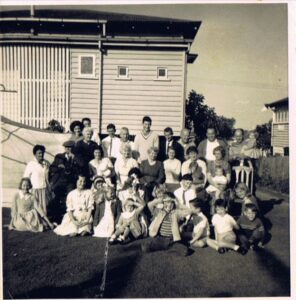
Photo of Robertson extended family at at his 90th birthday party for James Allan Robertson, 4 August 1964. Author photo.
Ellen passed away in December 1951. In 1964, a 90th birthday party was held for James at Jess’s house. I remember him at this party. He was the only one of my grandparents that I met. He seemed very large to me, not fat, just a big man. Even though he had been in Australia for about fifty years, he spoke to me in a deep voice with a very strong Scottish accent, which to twelve-year old me, was a little scary. But now I wish I had known him better. He passed away the following year.
Editors note: Refer to Yvonne’s story on 6 Feb 2023 of her grandfather, Len Tunny whose Soldier Settlement block was next door to James Robertson’s block.
[1] Robertson, James Allan, Statutory register births, 4 August 1874, Perth district, Perth County, 387/578 (1874) National Records of Scotland
[2] Williamson, Helen Leitch, Statutory register births, 13 April 1877, Parish of Lasswade, County of Edinburgh
[3] My great aunt Jessie Robertson Payne
[4] War records for James Allan Robertson. National Archives Australia, National Archives of Australia: B2455. P1
[5] National Archives of Australia:B2455, James Allan Robertson, P1
[6] ibid, P7
[7] The Beerburrum Story (1987) compiled by Russell Hopkins, Department of Forestry, Queensland. Obtained from Beerburrum State School
[8] Personal correspondence with author

Comments
Once a soldier. — No Comments
HTML tags allowed in your comment: <a href="" title=""> <abbr title=""> <acronym title=""> <b> <blockquote cite=""> <cite> <code> <del datetime=""> <em> <i> <q cite=""> <s> <strike> <strong>